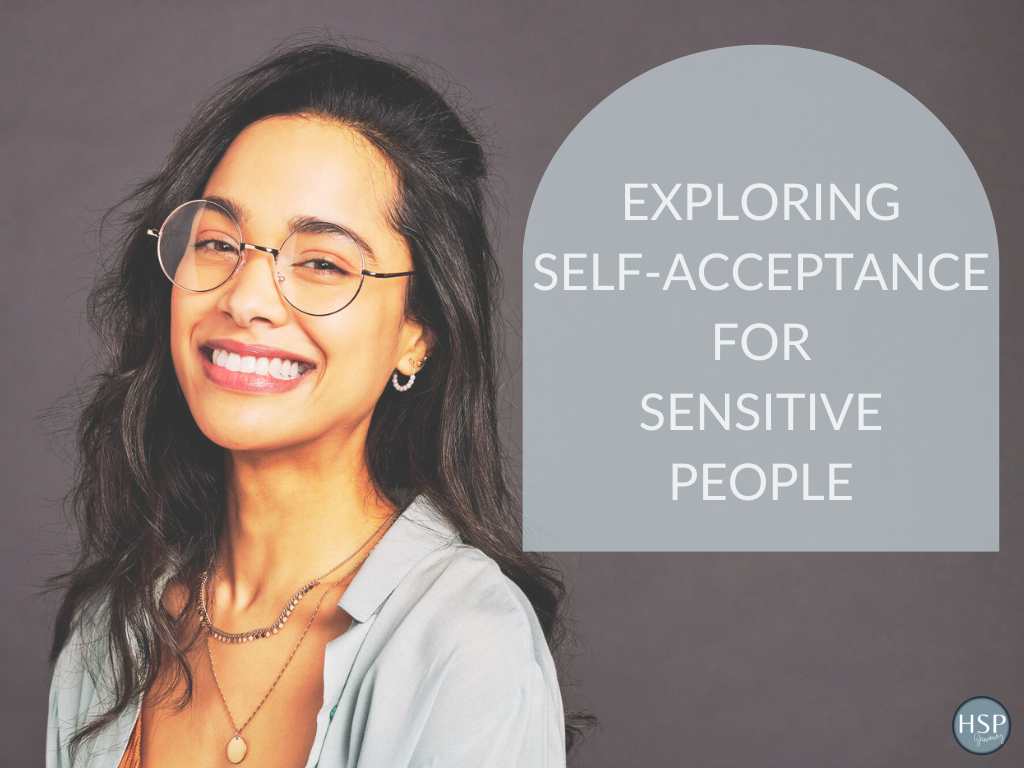Understanding your high sensitivity can be a transformative journey toward self-acceptance. Those of us who grew up highly sensitive and didn’t know this was a part of our personality, wind up needing to do a fair amount of work on themselves as adults learning to embrace self-acceptance as a highly sensitive person (HSP). When the messages you received during your formative years were negative, as an adult, you want to do the hard work to recognize what was and embrace what is. Exploring the areas in your past and present where you can recognize “what is” and accept yourself as you are is an invaluable skill to learn.
Navigating the path to embracing your sensitivity starts with recognizing that your characteristics are part of a natural and normal variation in human temperament. With about 15-20% of the population sharing this trait, you are not alone. Acknowledging that sensory processing sensitivity impacts your experiences allows you to create a lifestyle that respects your needs. Moreover, it paves the way for building resilience by setting healthy boundaries, seeking supportive relationships, and finding environments that align with your nuances.
Self-acceptance for someone with high sensitivity is not about changing who you are, but rather about creating a life where you can thrive. It’s about valuing your rich inner life and harnessing your ability to process deep thoughts and emotions. This isn’t just about overcoming challenges; it’s about celebrating your unique perspective and turning it into your superpower. By honoring your sensitivity, you can foster a sense of well-being, confidence, and harmony with both your internal and external worlds.

Table of Contents
What Self-Acceptance Is and Isn’t
Self-acceptance is embracing every aspect of yourself — both the strengths and the weaknesses. It’s recognizing your value as a unique individual, without necessarily comparing yourself to others or seeking external validation.
What Self-Acceptance Is:
- Feeling comfortable with who you are
- Acknowledging your emotions without judgment
- Embracing your sensitivity as a positive trait
- Realizing that mistakes are part of growth
What Self-Acceptance Isn’t:
- Pretending flaws don’t exist
- Overlooking the need for self-improvement
- Accepting abuse or mistreatment from others
- Equating self-acceptance with complacency

Self-acceptance doesn’t mean you think you’re perfect; it means you understand you’re human. When you accept yourself, you allow room for personal development. It’s a balance between recognizing where you are right now and where you could be with effort and time. Many sensitive people, myself included, are very self-aware. Often, it’s noticed that HSPs are much more self-aware, self-articulated, and self-developed than other non-sensitive people.
If you’re a sensitive person, it’s particularly important to differentiate between self-acceptance and self-indulgence. Self-indulgence suggests letting sensitivity control you. In contrast, self-acceptance involves harnessing your sensitivity as a tool for empathy and depth of understanding.
Remember, self-acceptance is a journey, and it’s okay to take small steps. Celebrate your progress, and be patient with yourself as you navigate through self-awareness to self-love.
Self-Acceptance Isn’t the Same as Self-Esteem
Self-acceptance and self-esteem are often used interchangeably, yet they are fundamentally different concepts. Your self-esteem relates to how you evaluate yourself, whereas self-acceptance is about embracing who you are.
- Self-Esteem: Your self-esteem is like a personal rating system. It’s about how much you value your abilities and qualities. It can fluctuate with successes and failures.
- High self-esteem: “I did well; I am good.”
- Low self-esteem: “I failed; I am bad.”
- Self-Acceptance: Self-acceptance, on the other hand, is unconditional. It doesn’t depend on your achievements or setbacks. It’s about acknowledgment and understanding of your entire self, including strengths and weaknesses.
- Embracing diversity: Acknowledging that your sensitivity is just one aspect of a varied personality.
- Forgiveness: Being kind to yourself even when things don’t go as planned.
For you as a sensitive person, distinguishing between the two is crucial. While self-esteem can be a rollercoaster, prone to the highs and lows of life’s circumstances, self-acceptance is the solid ground upon which you can stand, regardless of the successes or failures you experience.
To foster self-acceptance:
- Regularly affirm: “I am enough as I am.”
- Understand that mistakes are part of growth, not reflections of your worth.
- Celebrate your uniqueness, including your sensitivity, which is an asset, not a flaw.
Accepting Negative Parts of Yourself
Sensitive individuals often confront the challenge of intense negative emotions. You might feel overwhelmed by feelings like anger or sadness, causing a heightened emotional reactivity. Acknowledge these emotions are part of the human experience. They don’t diminish your value but rather signify that you’re attuned to your surroundings and inner world.
Practice mindfulness; it allows for a non-judgmental space where you can observe your feelings without letting them define you. For instance:
- When experiencing a negative emotion, take a deep breath and name it silently to yourself (“This is frustration”, “I’m feeling hurt”).
- Use mindfulness techniques such as focused breathing or meditation to help create distance between you and your immediate reactions.
Engaging in reflection is pivotal. Set aside time each day to reflect on what triggered your emotions. This could be a journaling exercise or a quiet contemplation period. Reflect on questions like:
- What situations amplify my negative emotions?
- How can I respond to these situations more constructively?
Remember that growth is an ongoing process. Construct a personal development plan with achievable steps toward managing your emotional responses. It might look like:
- Learning to pause before reacting to strong emotions.
- Developing coping strategies, such as talking to a friend or going for a walk.
By accepting all parts of yourself, inclusive of the negative ones, you foster an environment ripe for personal evolution. Being gentle and patient with yourself during this journey is essential. Embrace your sensitivity and consider it a strength, for it is a sign of your depth and capacity for empathy.
Accepting Limitations
For those with a heightened sensitivity, recognizing and accepting your limitations is a crucial step towards self-acceptance. Your challenges are unique to you, like a personal blueprint that shapes your experiences and interactions with the world around you.
Challenges
Maintaining control in situations that overwhelm your senses can be tough. You might feel exposed to the world’s barrage of stimuli, but it’s important to remember that this sensitivity is part of your innate nature. Acknowledge these challenges without judgment and embrace them as part of your distinctive make-up.
Resilience grows from understanding and setting boundaries. If high levels of stimuli make you feel overly excited or anxious, give yourself permission to step back and recalibrate. Your ease of excitation is not a flaw but a characteristic that requires mindful management.
- Manage:
- Low sensory threshold: Create environments that cater to your need for less sensory input.
- Social settings: Engage in them on your terms, in ways that feel comfortable for you.
- Expectations: Align them with your true capacity, not what others might demand.
Remember, you can’t control everything. Embrace your sensitivities, advocate for your well-being, and design a life that respects your unique thresholds. This isn’t about limitations—it’s about discovering your strengths within them.
Looking for HSP Tools to Thrive in a Chaotic World?
The modern world is often overwhelming and stressful for those of us with sensitive nervous systems. Many of us have suffered from the challenges of high stress, anxiety, sensory overload, and mental health and physical health issues. Fortunately, after years of working with and researching Highly Sensitive People (HSPs), Julie Bjelland has developed many tools that have not only helped her but thousands of HSPs all over the world move out of survival mode living and into thriving. In this free webinar, she’ll share the tools that HSPs have found the most life-changing. Her goal is to help you live to your fullest potential because the world needs you.
Join this free webinar and get tools to help you thrive as an HSP!
Self-Acceptance and Change
Embracing self-acceptance is integral to your personal growth. Acknowledge your emotions, including the negative ones. By accepting them, you create room for reflection and growth.
| Challenge Yourself |
|---|
| Recognize that change is a part of life and that accepting yourself doesn’t mean staying static. |
Mindfulness helps you become aware of your emotional reactivity. This awareness is crucial, especially if you have a low sensory threshold or experience ease of excitation. Practicing mindfulness can lead you to a calm state of mind, even when faced with challenging situations.
- Identify What You Can Control: Focus on your reactions and behaviors rather than external circumstances.
- Build Resilience: Embrace challenges as opportunities for growth. Your resilience strengthens each time you overcome adversity.
- Personal Growth: Reflect on your experiences to find meaning and lessons, cultivating a deeper sense of self.
Remember, every step towards self-acceptance is a stride towards embracing change with more ease.
Coping with Grief
Sensitive individuals often experience grief with intense emotions. It’s important for you to understand that grief is a natural response to loss and acknowledging your feelings is the first step towards healing. Below are some strategies you can use:
- Recognize Your Feelings: Accept that your grief can trigger a range of emotions; from sadness to anger, and this is normal.
- Express Yourself: Journaling or talking with friends can help you process these feelings.
- Maintain Healthy Habits: Ensure that you are eating well, getting sleep, and engaging in physical activity as these can help manage stress.
| Self-Care Activity | Benefit |
|---|---|
| Meditation | Reduces anxiety and centers your thoughts |
| Deep-breathing Exercises | Helps control the physiological symptoms of stress |
| Engaging in Hobbies | Provides a sense of normalcy and enjoyment |
- Seek Social Support: Sharing your loss with others can provide comfort and build connections.
- Set Boundaries: It’s okay to say no to demands on your time and energy. Prioritize your well-being.
In some cases, professional help is beneficial. Therapists specialize in grief counseling and can offer personalized coping mechanisms. If your grief feels overwhelming, don’t hesitate to seek therapy.
Remember, coping with grief is a personal journey. The aim is not to ‘get over’ the loss but to integrate the experience into your life. Give yourself permission to feel and heal at your own pace.
Moving Forward with Self-Acceptance
As you embark on the journey of self-acceptance, remember that personal growth is a constant, evolving process. It begins with recognizing your unique sensitivity as a strength. Embrace it, knowing it shapes your interactions and perceptions in valuable ways.
Start by setting small, attainable goals that celebrate your sensitive nature. List these goals and track your progress to visualize positive outcomes:
- Goal setting: Develop personal affirmations that reinforce your value.
- Progress: Recognize and record daily achievements, no matter the size.
When faced with decisions, listen to your intuition. Your heightened level of emotional awareness can guide you to choices that are in harmony with your true self. Use the following framework to assess options:
- Does this decision align with my core values and promote well-being?
- Will this enhance my journey toward self-acceptance?
Commitment to your path is essential. Dedicate time each day for self-reflection. This can be through journaling or meditation, enabling a deeper connection with yourself.
During this time:
- Reflect on what you’ve learned about yourself.
- Plan how to apply this understanding in your daily life.
Finally, fostering a sense of purpose drives self-acceptance. Identify activities and causes that resonate with you. Contributing to these can provide a sense of fulfillment and reinforce your self-worth. For example:
- Volunteer for a cause that aligns with your values.
- Engage in hobbies that allow you to express your sensitivity creatively.
- Build a business that utilizes your skills or apply your acumen to the work you love.
Remember, you’re not alone on this journey. Seek support from friends, family, or groups who appreciate your sensitive nature. Their encouragement can amplify your strides towards self-acceptance.
Frequently Asked Questions
This section responds to common questions that highly sensitive people grapple with as they work towards self-acceptance and managing their emotions in various aspects of life.
What are effective strategies for self-acceptance as a highly sensitive individual?
To foster self-acceptance, start by acknowledging your sensitivity as a strength rather than a flaw, allowing you to experience the world with rich detail and emotion. Practicing mindfulness can help you stay present and cultivate a non-judgmental attitude towards yourself. Regular reflection through journaling also provides a way to understand and accept your feelings and experiences.
What are some tips for managing intense emotions for sensitive people?
If you’re experiencing intense emotions, establish a soothing routine that includes activities such as deep breathing, meditation, or gentle exercise. Identify your triggers and set boundaries to protect yourself from overwhelming situations. It is crucial to give yourself permission to step back and take time for self-care when needed.
How can sensitive individuals maintain healthy relationships while managing their emotional sensitivity?
Communicate your needs clearly with your loved ones, helping them to understand your sensitivity. Seek supportive relationships with people who respect your feelings. Work on emotional regulation techniques to respond, rather than react, to emotional highs and lows. This balance allows for nurturing relationships while honoring your sensitivity.
Overall, self-acceptance empowers HSPs to move through the world with more confidence, self-understanding, and self-care. This supports their wellbeing and helps them thrive despite the unique challenges of high sensitivity.
Be sensitive, be free
*This post contains affiliate links and I will be compensated if you make a purchase after clicking on my links*





[…] self-acceptance and self-love as pillars of personal […]